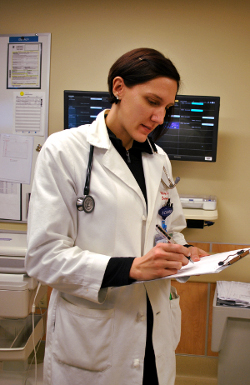
The Department of Emergency Medicine at OHSU is home to 119 full-time faculty, 16 part-time faculty, and 30 adjunct faculty members under the direction of Mary Tanski, M.D., M.B.A., professor and Department Chair. The faculty, residents and staff serve 49,000 patients per year in OHSU's Level 1 Trauma Center. EM faculty also staff an onsite designated Pediatric ED and the Oregon Poison Center. The Department of Emergency Medicine at OHSU is ranked 4th in NIH Funded Research and is home to the Center for Policy and Research in Emergency Medicine (CPR-EM), whose faculty include noted researchers Craig Newgard, M.D. and John McConnell, Ph.D. among others. Our residency program, led by Program Director David Jones, M.D., currently trains 33 residents and offers a diverse training environment through partnerships at several area hospitals. OHSU offers EM specialty training in the form of select fellowships in: Research, Education, Pediatric Emergency Medicine, Administration, Emergency Medical Services (EMS), Toxicology, and Ultrasound.
We are proud to serve OHSU's mission of Healing, Teaching, and Discovery.
Want to work for the DEM?
Visit the OHSU Jobs page.
Emergency care
OHSU is Oregon's 24 hour resource for the most complex medical emergencies and trauma care. Visit the OHSU & Doernbecher Emergency Care website for additional details.